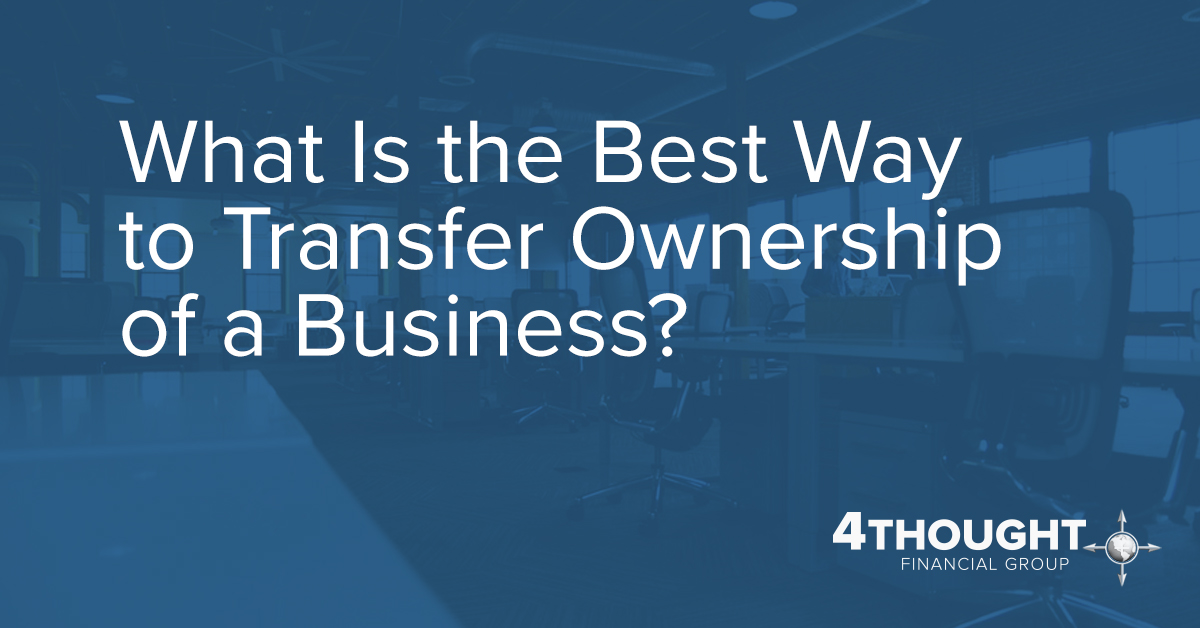

Wealth Management by 4Thought Financial Group
"The comprehensive wealth management we provide involves the coordination and execution of four different types of financial planning: Investment Planning, Estate Planning, Business Succession Planning and Fringe Benefit Planning."
Business succession is one of the most complicated subjects that all privately held business owners are eventually faced with.
Business owners do not want to give up control. I recently heard a great comment from a former business owner, who finally at age 85 decided to sell to an unrelated third party: “I should have sold 15 years earlier!” In this business owner’s family, no one was interested in going into the business. But it is much more complicated when family is involved versus not. Either way, there are many reasons to wait. There are also many reasons to act expeditiously.
Below are some issues and approaches to consider when dealing with business succession. Your accountant or tax advisor and lawyer should be consulted before any strategies are implemented.
One of the key words above is “strategy.” Transferring ownership of a business is based on a strategy. Once a strategy is agreed upon, a process should be followed to make sure all issues are addressed, and nothing falls through the cracks.
Leaving Your Ownership to Your Family via Your Will
This strategy is typically the default if no time or thought process was involved. When this strategy is looked at more closely, there are a host of issues. Here are a few:
Is the spouse qualified to run the business? If he or she is, that would be terrific. What about professional licenses—would these be required to run the business? If it is a business that has not kept up with the times, how much of an investment is required to bring it current? Does it even make sense to do that? If the business entity owns real estate, maybe the real estate is worth more as a rental property.
As you can see, many, many questions can come up. It is best to discuss these issues sooner rather than later. The loss of the founder and his/her long-term relationships can be a colossal failure for the business if the succession process is not planned and started early.
Gifting the Business to Family Member Employees During the Owner’s Lifetime
Does the business employ qualified family members who are interested in continuing operations after the owner is done? If so, the strategy of gifting the business certainly offers many planning opportunities. If the founder is hesitant to hand over ownership all at once, then the strategy can be to give a little each year. Consideration must be given when determining the value of a gift and the hiring of an appraiser. All gifting options would require the business to be appraised. This could get very expensive if done every year. Once the business owner gives up 49% of the ownership, they can stop and keep control. Should a trust be used to protect family from outside invaders, like lawsuits, divorce and taxes? Should the trust provide income back to the business owner? Who are the beneficiaries of the trust and how long should the assets stay in the trust?
We recently used a strategy called a “sale to a defective trust.” In this case, the business owner received income and principal back in the form of a note payable. A business appraisal was done, which gave a discount to the 49% gift into the trust since it was a minority interest. Many benefits can come from this strategy, including no capital gains tax to the business owner on sale to his own grantor trust, as well as pinning the value of the 49% at today’s value. It’s a complicated strategy that needs mutual involvement from all parties to work successfully.
Selling Ownership to a Third Party
Does selling the ownership interest make the most sense? It depends on many factors, including the health of the owner, family considerations, the type of business, and whether the owner still enjoys being involved. I have recently seen more and more business owners unable to sell their business because they waited to long. I always think of the basketball coach of the UCLA Bruins, John Wooden, as an example of someone who retired at the top of his game. He’s a college basketball legend. When a business owner is at the top of his game, he can negotiate from a position of strength and potentially get the highest value on sale. There are also creative planning strategies available, such as the use of a Charitable Trust to minimize capital gain taxes and simultaneously enrich a charity.
Cash flow projections should be performed for all potential strategies before any of them are implemented. It’s better to err on the conservative side when considering future taxes, interest rates, rates of return, and longevity risk.
In my book, “The Widow’s Survival Guide,” I include the following passage, which is pertinent to this conversation:
“Remember, ultimately our considerations have to do with quality of life—your life. Your financial planning should be designed to ensure a comfort level for you and your emotional security. Keep your family together as best you can. Too many families are spread out over vast geographical areas. Whenever possible, it is best to minimize the emotional space between family members. The best investment I can recommend is to maintain the health and growth of family ties.”
This above passage remains true today as it did yesterday, and will continue to be true in the future.
4Thought Financial Group
Do you want to explore the potential succession planning strategies for your privately held business? 4Thought Financial Group provides comprehensive wealth management services designed to coordinate your business succession, estate planning, fringe benefits, and investment planning. Click here to contact 4Thought today and get started.








Leave a Comment